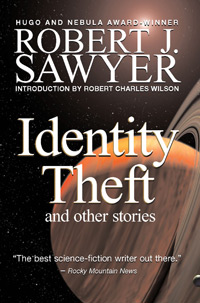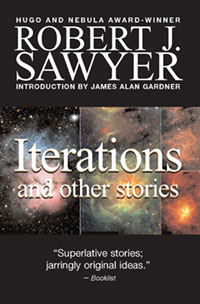Interview with JJA about Identity Theft

Two months ago, the SciFi Channel's SciFi Wire ran a nice little piece by John Joseph Adams entitled "Identity Theft is Sawyer's Last Collection."
To prepare that article, John did a much longer by E-mail interview with me, and I thought I'd share the whole thing here:
(1) Please describe the book -- just enough to give readers a taste of the collection. (Another way of asking this would be to say: What kind of stories do you write?)
This is my second, and final, collection of short fiction. I've published 40 or so short stories over the last couple of decades. I find short fiction very hard work, although I guess I'm good at it: Identity Theft and Other Stories contains two Hugo finalists; a Nebula finalist; a story that won Analog's Analytical Laboratory award; a piece that won Europe's top SF award, the 6,000-euro Premio UPC de Ciencia Ficción; two winners of Canada's top SF award, the Aurora; and three stories that are currently have their film rights under option.
But I really prefer writing novels, and so am going to concentrate on them from now on. Between Identity Theft and my previous collection, Iterations, which Red Deer Press has just reissued with a handsome new cover complementing the one on Identity Theft, we now have the Collected Stories of Robert J. Sawyer in two very attractive volumes.
The stories I'm proudest of in Identity Theft are the ones that get at a real human truth without sacrificing the sense of wonder, such as "Come All Ye Faithful" about the only priest on Mars, "Relativity," about a female astronaut returning to face a family that's aged a lot more than she has, and "Shed Skin," which was the seed for my novel Mindscan, about a fellow who has transferred his consciousness into an artificial body and realizes he's made the worst mistake of his life.
(2) Tell me a bit about the title story: a bit of synopsis and/or a bit of background on how you came to write the story.
"Identity Theft" is a novella -- 22,000 words -- and it takes up about a quarter of the book. It was commissioned by Mike Resnick for an original Science Fiction Book Club anthology called Down These Dark Spaceways. A lot of my novels -- including Golden Fleece, Fossil Hunter, The Terminal Experiment, Illegal Alien, and Hominids -- have been SF/mystery crossovers, so Mike felt I'd be a good fit for this anthology of SF hard-boiled detective stories. I took all my favorite things -- fossil hunting (on Mars!), musings about the nature of consciousness, and what I hope is snappy, sarcastic dialogue -- and put them together.
(3) Please illustrate the range of the collection by briefly comparing/contrasting a story on one end of the spectrum with one on the other end.
Identity Theft contains a wide range of stories. The most mainstream is "Driving a Bargain," which I wrote for a young-adult horror anthology edited by Edo van Belkom; it's about a teenage boy struggling to find a used car that he can afford, and not looking too carefully about why one offered to him is cheaper than it should be.
At the other end, I take us to the very end of Earth's existence in "On the Surface," which I think is one of my very best stories. Do you know the ending of The Time Machine -- the part that's left out of all the movie adaptations? Before returning home to the 19th century, H.G. Wells's Time Traveler takes a jaunt to the far, far future, when the sun is dim and red. Well, I thought to myself, if it's that dim, the Morlocks finally could back onto the surface and reclaim our planet ...
(4) Was there anything about any of the stories that was unusual or noteworthy? For instance, was there one that was personal to you on any level, or for which you had to do a lot of research, anything like that? If so, please discuss.
The whole world was shocked on February 1, 2003, when the space shuttle Columbia disintegrated on re-entry, but my shock was worse than some, I imagine. I do commentary on space missions from time to time for CBC radio and TV, but I happened to be fast asleep that morning when my phone rang, and a producer woke me basically saying, "They've lost contact with Columbia, and you're on the air in five ... four ... three ..."
I take no pleasure in the fact that I predicted in my 1998 novel Factoring Humanity that there would be another shuttle disaster after Challenger. But I am endlessly fascinated by the fact that we gave up in 1972 going any more than a few hundred kilometers from Earth. In direct response to the loss of Columbia, I wrote "The Eagle Has Landed." Another story in my book, "Mikeys," also deals with my deep fondness for the manned space program.
(5) Do you have any favorites in the book? If so, what about those stories make them stand out for you?
One of my favorites is a story called "Flashes," about what might really happen if SETI ever resulted in us actually receiving the Encyclopedia Galactica from aliens -- the accumulated knowledge of advanced races. I actually thought about calling that story "Infodumps," which is the pejorative term some of those who don't like for any sort of expository passage. When I was writing the story, I thought it might be cool years down the road to have it as the title story in a book: a hard-SF collection called Infodumps might tweak the critics in a way that would have amused me. But my wife talked me out of that. Still, I think it's a very nifty story, with some of the best imagery I've ever come up with, and I had a blast writing snippets of Encyclopedia Galactica entries on topics such as "Life After Death" and the fictitious science of "Chronics."
(6) Anything else you'd like to add?
For me, one of the coolest things about bringing all these pieces together into a single a book was the chance to write story notes. Each story has an introduction by me, telling a bit of the history of how I came to write the piece. I always find such notes fascinating in other writers' collections -- and find collections that don't have them rather unsatisfying. I tried to be as candid as I could be, and I hope other people enjoy not just the stories but these peeks into their creation, as well.

The Robert J. Sawyer Web Site



0 Comments:
Post a Comment
<< Home